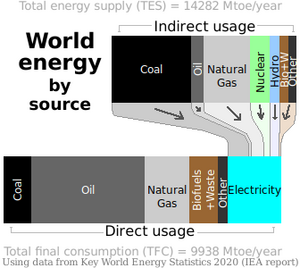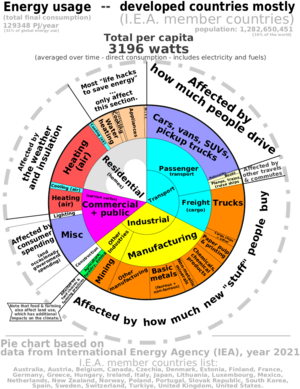Energy: Difference between revisions
No edit summary |
|||
| (14 intermediate revisions by the same user not shown) | |||
| Line 1: | Line 1: | ||
{{banner|There is currently no way to power the world without fossil fuels | {{banner|There is currently no way to power the world without fossil fuels, until major technological breakthroughs happen.<br /><small>We have to consume less - this is not as hard as it sounds.</small>}} | ||
This page is about energy in 2 main forms: '''fuel and electricity'''. | This page is about energy in 2 main forms: '''fuel and electricity'''. | ||
==Energy supply== | ==Energy supply== | ||
===The majority of energy comes from [[fossil fuels]] | ===The majority of energy comes from burning [[fossil fuels]] - the main cause of [[climate change]].=== | ||
[[File: energy-usage-by-source.png|thumb|World energy by source]] | |||
[[File: energy-usage-by-source.png| | {{minor|Fossil fuels include [[coal]], [[oil]] and [[natural gas]].}} | ||
===What about other energy sources?=== | ===What about other energy sources?=== | ||
{|class="wikitable" | {{minor|Main reasons why non-fossil-fuel energy sources aren't being scaled up:}} | ||
{|class="wikitable" style="margin-top:0" | |||
!<div style="text-align:left">Energy Source</div> | !<div style="text-align:left">Energy Source</div> | ||
!<div style="text-align:left">Main Limitation</div> | !<div style="text-align:left">Main Limitation</div> | ||
| Line 33: | Line 33: | ||
|- | |- | ||
|[[Geothermal]] | |[[Geothermal]] | ||
|Geography | |Geography - <small>in most parts of the world, it's only suited for [[heating]] & [[cooling]].</small> | ||
|} | |} | ||
Solar and wind are also limited by [[energy storage]].* | Solar and wind are also limited by [[energy storage]].* | ||
| Line 39: | Line 39: | ||
<nowiki>*</nowiki>Limitations marked with an asterisk (*) are possible to overcome '''with the right innovations'''. | <nowiki>*</nowiki>Limitations marked with an asterisk (*) are possible to overcome '''with the right innovations'''. | ||
For more details, read the wikipages of each energy source. Links are in the table above. | |||
==Energy demand== | ==Energy demand== | ||
[[File:energy-demand-pie1.png|thumb|Pie chart of energy demand, based on countries where precise data is available.]] | |||
[[File: energy-demand- | Since most energy consumption is bad for the planet, let's look at how it could be reduced - starting with the biggest pieces of the pie. | ||
{{mbox|Note: These actions are mostly directed at "first-world" countries, which use a disproportionately large amount of energy. In other parts of the world, consumption doesn't necessarily have to be reduced.}} | |||
{{minor|We could probably cut all energy consumption in '''half''', while barely losing any quality of life. It just requires some planning (both individually ''and'' as a society).}} | |||
===Transportation=== | |||
===Transportation | |||
Some things that would help: | Some things that would help: | ||
* [[Walkability]] - <small>organizing neighborhoods so things are in optimal locations, so people don't have to drive as far as often.</small> | * [[Walkability]] - <small>organizing neighborhoods so things are in optimal locations, so people don't have to drive as far as often.</small> | ||
| Line 68: | Line 55: | ||
* [[Carpooling]] - <small>yes, this takes some effort and coordination.</small> | * [[Carpooling]] - <small>yes, this takes some effort and coordination.</small> | ||
=== | ===Homes & buildings=== | ||
In buildings & homes, [[heating]] is the biggest piece of the pie (and [[cooling]] is the second-biggest). Energy-saving solutions haven't been added to this wiki ''yet''.{{rn}} | |||
A common misconception is that "saving energy" is all about turning off lights, turning off computers, etc. Those actions may be worthwhile but don't actually make a ''big'' difference. '''Other''' personal lifestyle choices do: | |||
===Consumerism=== | |||
More than a third of energy demand{{x|commercial vehicles + industrial/manufacturing + ''some'' commercial spaces}} is affected by '''what people buy''', and '''how much''' of it. | |||
To deal with this piece of the pie, we need: | |||
* [[Frugalism]] - i.e. '''buying less stuff!''' | |||
* Fighting against: [[business waste]], [[planned obsolescence]] and [[code bloat]]. | |||
* Fighting '''for''' [[right to repair]]. | |||
* [[Running new software on old computers]], perhaps? {{npn}} | |||
==See also== | |||
* [[Electric vehicles]] | |||
* [[Labor]] {{light|- another factor that affects quality of life}} | |||
* [[Energy supply solutions summary]] | |||
Latest revision as of 17:01, 3 November 2023
We have to consume less - this is not as hard as it sounds.
This page is about energy in 2 main forms: fuel and electricity.
Energy supply
The majority of energy comes from burning fossil fuels - the main cause of climate change.

Fossil fuels include coal, oil and natural gas.
What about other energy sources?
Main reasons why non-fossil-fuel energy sources aren't being scaled up:
Energy Source
|
Main Limitation
|
|---|---|
| Hydro | Geography |
| Nuclear | Needs uranium-235 which is too scarce* |
| Solar | Too many rare metals needed* |
| Wind | Geography |
| Biofuel | Causes deforestation and global hunger |
| Waste | Limited supply |
| Geothermal | Geography - in most parts of the world, it's only suited for heating & cooling. |
Solar and wind are also limited by energy storage.*
*Limitations marked with an asterisk (*) are possible to overcome with the right innovations.
For more details, read the wikipages of each energy source. Links are in the table above.
Energy demand

Since most energy consumption is bad for the planet, let's look at how it could be reduced - starting with the biggest pieces of the pie.
Note: These actions are mostly directed at "first-world" countries, which use a disproportionately large amount of energy. In other parts of the world, consumption doesn't necessarily have to be reduced.
We could probably cut all energy consumption in half, while barely losing any quality of life. It just requires some planning (both individually and as a society).
Transportation
Some things that would help:
- Walkability - organizing neighborhoods so things are in optimal locations, so people don't have to drive as far as often.
- Public transit done right. Yes, there are plenty of ways for it to be done wrong!
- Working from home - only suited for some types of work, of course.
- Carpooling - yes, this takes some effort and coordination.
Homes & buildings
In buildings & homes, heating is the biggest piece of the pie (and cooling is the second-biggest). Energy-saving solutions haven't been added to this wiki yet.[RESEARCH needed]
A common misconception is that "saving energy" is all about turning off lights, turning off computers, etc. Those actions may be worthwhile but don't actually make a big difference. Other personal lifestyle choices do:
Consumerism
More than a third of energy demand
To deal with this piece of the pie, we need:
- Frugalism - i.e. buying less stuff!
- Fighting against: business waste, planned obsolescence and code bloat.
- Fighting for right to repair.
- Running new software on old computers, perhaps? [new page needed]
See also
- Electric vehicles
- Labor - another factor that affects quality of life
- Energy supply solutions summary